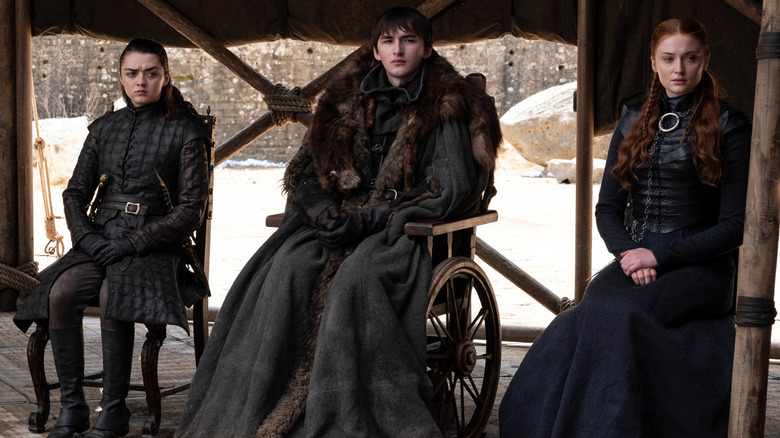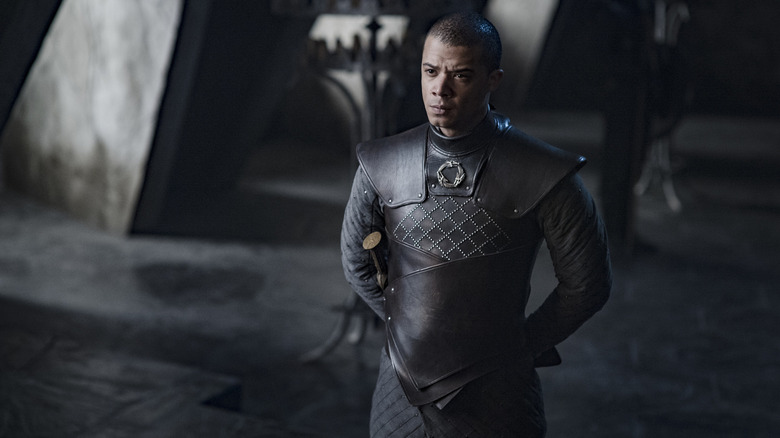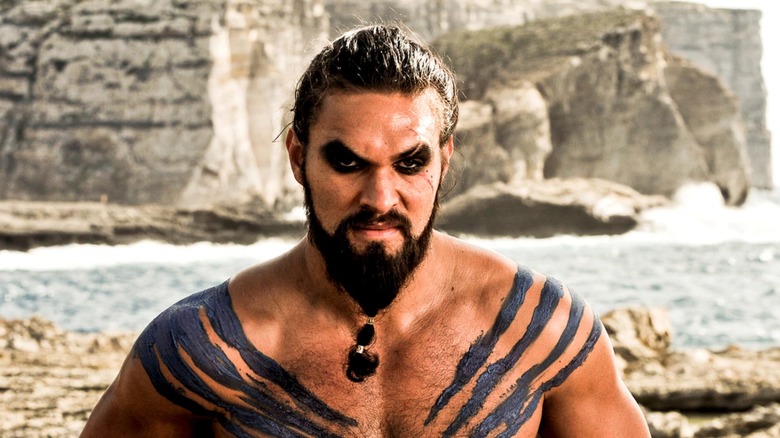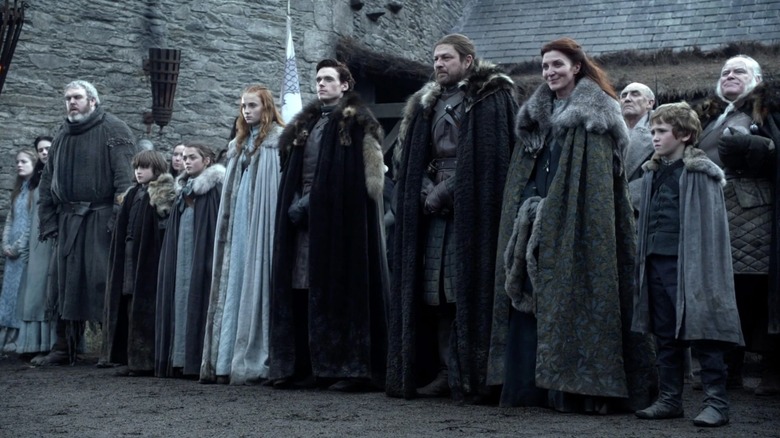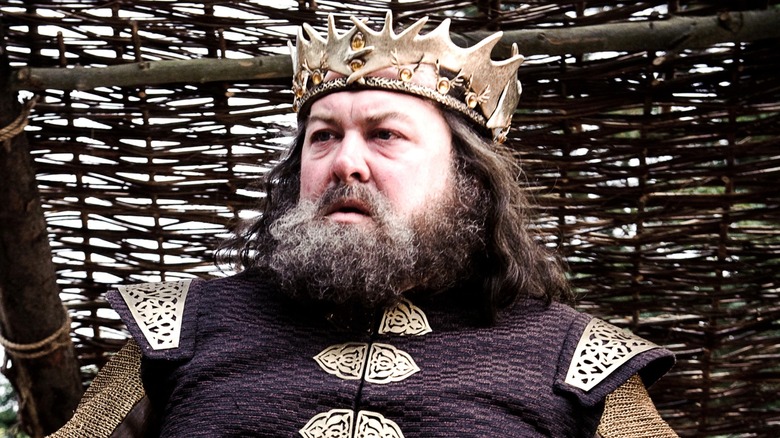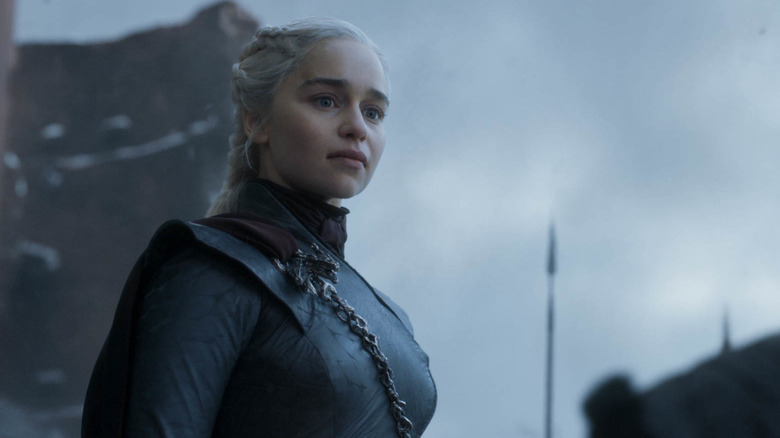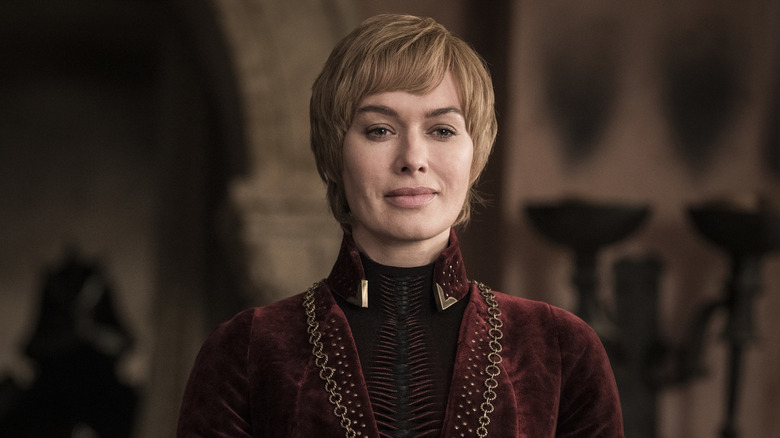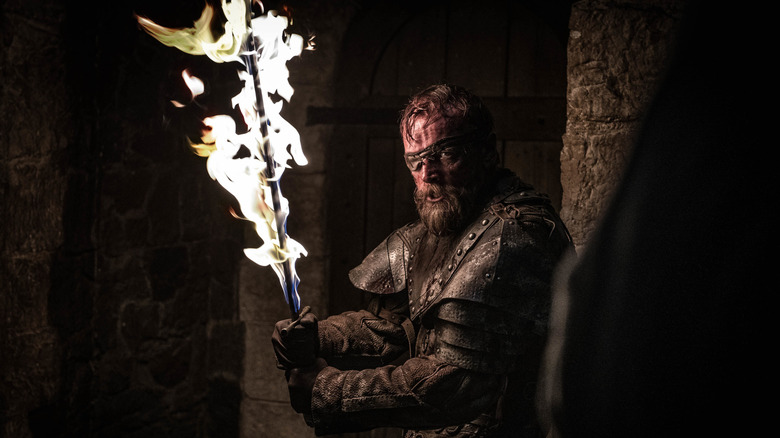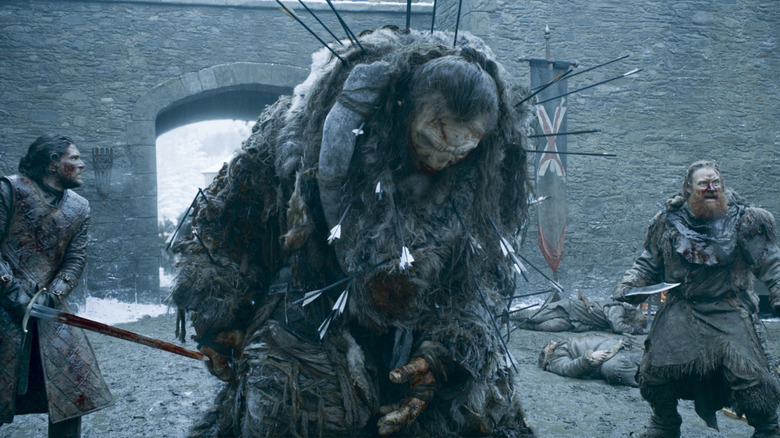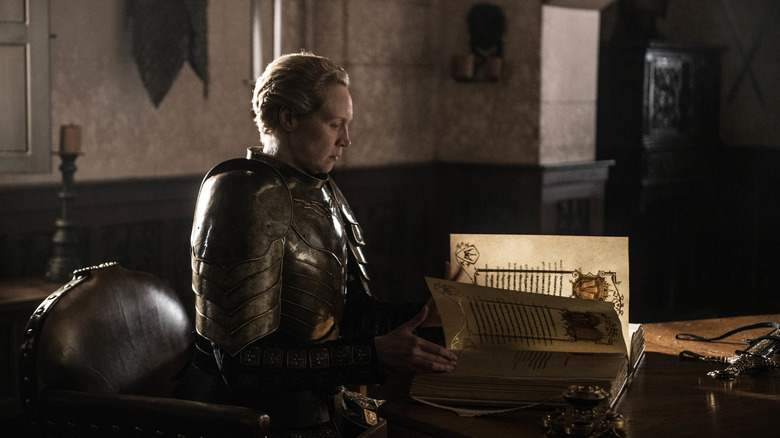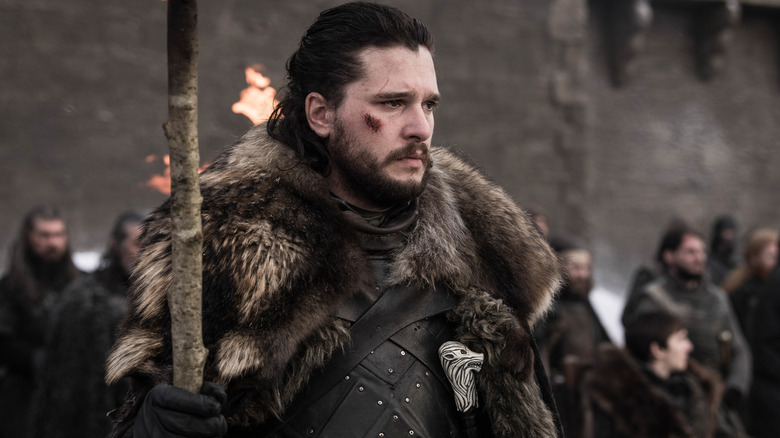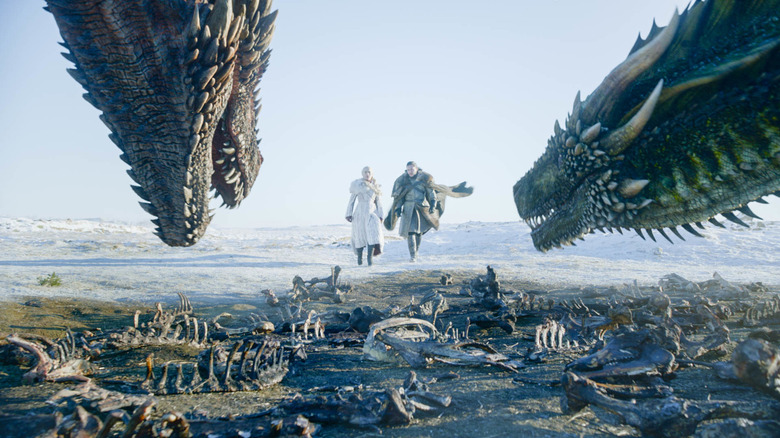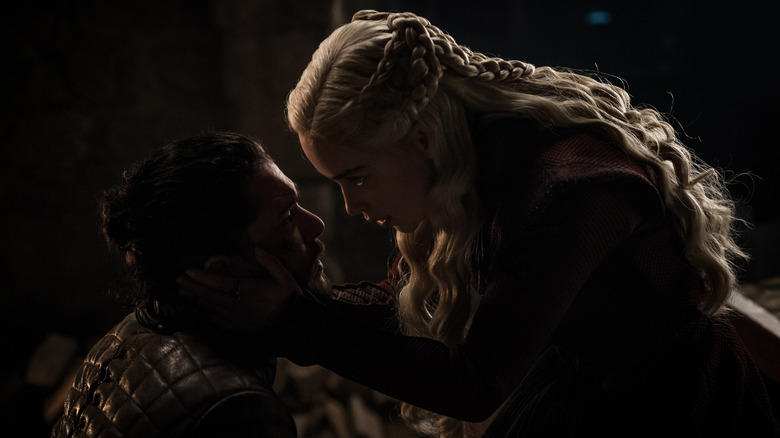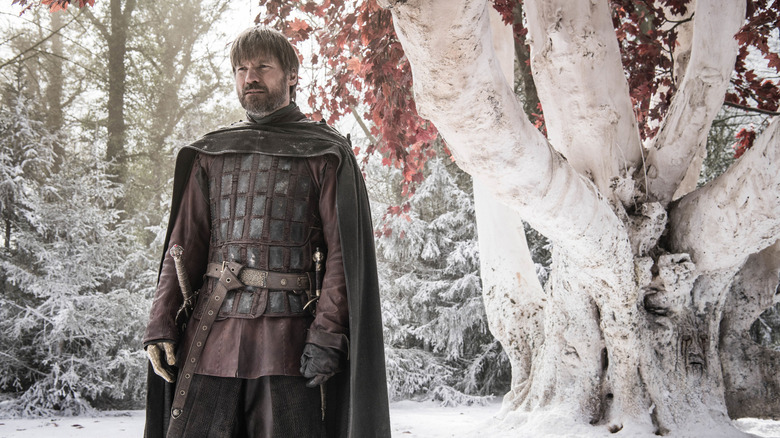13 Deep-Cut Game Of Thrones Facts That Will Change The Way You See The Show
Across a legendary series of novels and eight seasons as one of the most popular TV series of all time, "Game of Thrones" has been kicking around in our heads since 1996 and shows no sign of slowing down. With its prequel, "House of the Dragon" on its way to Season 2 and seemingly endless spin-offs and continuations in the works, chances are that we'll be talking about the series for some time to come. Though it remains a hot topic among TV fans, there's no denying that this series had viewers glued to the set during its time on the air. With the original TV series wrapping in May of 2019, that's given us a lot of time to watch, and rewatch, our favorite episodes.
With that level of time and scrutiny, you can bet we've picked up on some wild hidden trivia over the years, some of which leaves us scratching our heads in confusion; some of which adds layers of appreciation we didn't have before. From clever subtleties like Daenerys' hairstyle mirroring her moods to the reappearing Lannister family crossbow, fans have scanned this series for continuity conflicts and Easter eggs ad nauseam. Yet, even with all those late-night Reddit threads on our side, the franchise is dense enough that there are still moments in every rewatch that rearrange our understanding of the show that truly dominated our collective consciousness throughout the 2010s.
The Butterfly Fever
As the chosen commander of the Unsullied, the slave-soldiers of Astapor, Grey Worm has a rockier time playing the game of thrones than most. Serving in an army that necessarily relies on subjugation and cruelty, he celebrates Daenerys' arrival as she frees the people of Slaver's Bay. Grey Worm is loyal to his queen after she seizes the Iron Throne and becomes the "mad queen." If it feels like it requires a truly superheroic level of mental gymnastics to stay on Daenerys' side after her heel turn, take a moment to consider how terrible everything must have been for the Unsullied before Dany showed up.
After Missandei is killed and Dany's brief reign ends, Grey Worm guides the Unsullied to the isle of Naath. This is in reference to something his love Missandei once said about wishing to return to her home after having been stolen from the island as a child. On the surface, Grey Worm's return to the isle is a tribute to Missandei and a promise to expel any violent forces that attempt to take more children as it once did to her. However, in the companion for "A Song of Ice & Fire" titled "A World of Ice & Fire," we are informed that the isle is home to something called the Butterfly Fever, which eventually kills anyone who wasn't born there. While it's assumed that this is not canon in the TV series as it's never brought up, it adds chilling context if the Unsullied are, rather than vowing to live life as protectors, actually sailing to their deaths.
Drogo's unsubtitled line
The nomadic Dothraki are one of writer George R. R. Martin's most interesting creations, and while the show goes into some depth exploring them, there are plenty of fascinating details that never make it to the screen. For instance, the novels tell us that Dothraki history is full of wildly impressive feats, such as the defeat of the so-called Tall Men after a 2,000-year reign. In the show, we are introduced to them mostly through Khal Drogo, who is the husband of Daenerys in Season 1 before meeting a violent end. Dany truly comes to love the Dothraki over time, although there's little arguing that she leads them down some pretty messed up paths.
Additionally, Dothraki speech is actually its own language, created by none other than linguist David J. Peterson, who is responsible for a number of fictional dialects. Yet Drogo had one unsubtitled line in "Winter is Coming" that had fans wondering what exactly he might have said. After seeing a fighter disembowel another, he says something that isn't part of the Dothraki language. It turned out to be an ad lib by Jason Momoa, who said, "i te waka," a Maori phrase that roughly translates to "on the canoe." According to a blog post, Peterson retroactively changed this to the Dothraki line, "Itte oakah!" which translates to "test your might," a "Mortal Kombat"-like line that adds a bit of humor to an otherwise pretty gruesome scene.
The Starks are only together once
"Winter Is Coming" — the "Game of Thrones" series premiere — remains an incredibly influential episode of television, but it's also the motto of House Stark. Issuing a warning to their enemies by ominously identifying a coming storm is very much in line with the family's legacy, and this episode is indeed where we are introduced to most of the characters who will become major players throughout the series. Perhaps more intriguingly, this is both the first and last time we see the Starks together as a family. Though much of the show is defined by the legacy of this wild clan of warriors, the Starks as we know them are relatively fractured due to consequences of fate that begin this very episode.
By the end of the series, Arya, Bran, and Sansa are the last Starks left standing. Their individual journeys are some of the most compelling in the franchise, making it feel right that Bran becomes the new King of Westeros while Sansa rules the North as its own kingdom and Arya departs on an adventure of her own. Yet, there's no denying that they each require quite a lot of buildup to go from who they are when we meet them at Winterfell to where they ultimately end up. Though they lose most of their family along the way, this is a trio of icons and it's nice to see them succeed, even if they go through a lot of grief to get there.
King Robert's 'touch of death' theory
When we meet King Robert Baratheon, unbeknownst to us, he's nearing the end of his reign as the machinations of his wife Cersei will soon lead to his untimely demise. Once a powerful leader, Robert was devastated by the death of Lyanna Stark, entered into a backup marriage with Cersei and spent much of the ensuing years having affairs and drinking to excess. Oh, and he's also concerned with the small matter of attempting to wipe the Targaryens off the face of the planet due to the crimes of Prince Rhaegar, who apparently abducted Lyanna and left her for dead. Living for vengeance while turning to rampant hedonism in his off time, Robert comes across as fun and jovial to most who meet him, but we see immediately that he's a bit of a mess.
Yet, one of the most interesting hidden details about Robert doesn't have so much to do with him as it does the Starks. Fans have pointed out that in the opening episode of the series, when Robert arrives at Winterfell, he shows his characteristic charm in greeting the Starks that gather around him. Embracing Ned and Catelyn, ruffling Rickon's hair, and shaking hands with Robb, you can tell the fondness he has for the crew right off the bat. However, eagle-eyed viewers have noted that the Starks that Robert embraces all die, while the three he does not physically touch in this scene all survive the series. This is very likely a coincidence, but it adds an extra tidbit to chew on during a rewatch. Does Robert have the "touch of death?" Probably not, but maybe.
Dany's tolerance for heat is hinted at early
"Game of Thrones" might not pull off perfect continuity through its run and there are several little moments of confusion or plot points that are seemingly at odds with one another. But if there's one thing it stuck to its guns on from day one, it's that this was going to be Daenerys' "Joker" origin story. Though it's easy to sympathize with Dany as we watch the brutality of the game of thrones and the number it does on her mentally and emotionally, by the end of the line, we can pretty much say that's she's gone to the dark side in a way that even Anakin Skywalker might say goes too far. This is a woman that saw Cersei commit mass murder openly and said, "Hold my beer."
The intentionality of Daenerys' story was enough to give plenty of fans pause as they watched a woman who they'd come to care about fly fully off the deep end into the realm of war crimes. Yet, even in Episode 1, we see seeds being planted for her character trajectory. When Dany is perturbed and afraid that her brother is forcing her to marry Drogo simply to gain power, she goes to take a bath. Stepping boldly into hot water, she shocks the maid, who is afraid that she will be burned. This doesn't actually hurt Dany at all, which gives us a hint that she'll go on to quite literally walk through flames and live to tell the tale. While George R. R. Martin has noted that the Targaryens are not fire-proof, there is some indication that they are at least heat-resistant.
Cersei plans her murder of Robert a little better in the books
Creator George R. R. Martin has noted that his least favorite scene in the "Game of Thrones" HBO adaptation is the death of King Robert, although perhaps not for the reasons one might think. Explaining that there was no hunting scene in the novels, he notes that an actual king's hunting party would have consisted of about 100 men, with major celebration and spectacle around the event. For a show that needed to communicate the scene without tapping the budget into oblivion, the "hunting party" merely consists of a few men with spears. Yet, fans have a different issue with the scene — in their minds, Cersei's plan to kill Robert is haphazard and flawed.
It's true that hoping for a lucky boar goring incident doesn't seem quite up to snuff for the Machiavellian Cersei. Indeed, while the easiest explanation is that Robert's death by boar is an accident, Cersei very much plans that he'll never return from the hunting trip. We know she encourages Lancel to feed him an unending supply of wine. In the book, it's implied that she also assigns assassins to follow him into the woods, knowing that even if nothing else goes wrong, Robert will never live through the night.
Beric's notes he's been killed by multiple Cleganes
In the Season 3 episode "Kissed by Fire," Beric is resurrected after a truly epic battle with Sandor Clegane, perhaps better known as "The Hound." Having sentenced him to trial by combat and fighting him to a standstill with a flaming sword, Beric ultimately falls to Clegane, who taunts Arya. They are both surprised to realize the Beric has actually been resurrected by Thoros, who tapped into the power of the Lord of Light — a religion of which he is now a devout follower. He absolves Clegane, noting that since he fairly lost the fight, his opponent is now to be regarded as an innocent man, freeing him and allowing him to leave of his own accord.
Later, when Beric and Thoros are cracking wise about his many deaths (this being his sixth and penultimate death), Beric wryly notes that it's the "second time I've been killed by a Clegane." What? Did we miss something? Yes, we did. In fact, Beric's first death occurred during the Battle at the Mummer's Ford, which is never directly portrayed on the show. There, Beric was impaled through the chest by Gregor Clegane, although we know now that he lived to die another day. While this wasn't explained in the series, it is addressed on the "Game of Thrones" Blu-rays, on which an animated micro-series called "Histories & Lore" explains the history of the Brotherhood Without Banners, including Beric's chaotic history of violent deaths.
After Wun Wun's death, that's it for the giants
Wun Weg Wun Dar Wun, or "Wun Wun" for short, is a Free Folk giant that we meet in Season 5 and say goodbye to in Season 6 with a brutal death scene that remains one of the most memorable in the series. Though we aren't given much space to get to know our friend, his feats of strength are absolutely stunning, and he quickly becomes a great ally to Jon Snow and Tormund in the battle against the White Walkers. With Wun-Wun's help, Jon is able to retake Winterfell from Ramsay Bolton, but it's not without cost. Wun Wun dies, shot full of arrows, ultimately collapsing after Ramsay delivers the killing blow.
Although Ramsay is quickly beaten within an inch of his life by Jon and ultimately fed to his own starving hounds for his incredible acts of treachery, it doesn't quite ease the tragedy of Wun Wun's heroic but deeply painful demise. To make matters worse, Wun Wun very well might be the last giant, making this bloody end all the more heartbreaking. Though there is always a chance that we could be wrong, the deaths of Mag Mar Tun Doh Weg and Dongo during the attack on Castle Black seem to indicate that this is all she wrote for the giants. What a way to go.
The Ser Duncan the Tall references
Much the same as it is in our world, the "Game of Thrones" mythos is fleshed out with countless legends and stories of great warriors in days gone by. One of those mythical figures is Ser Duncan the Tall, a commander of the Kingsguard before and during the reign of Aegon Targaryen. While he understandably never appears in the show, he is referenced by Old Nan, who offers to tell Bran one of her stories. Throughout this conversation, it's gently implied that Old Nan might have once been intimately acquainted with Duncan, but that's a story for another time.
As for Duncan's legacy, we're still piecing that together. Martin has indicated that Brienne is a descendant of Duncan, which stands to reason considering what a legend she is in her own right. We might not know the details around this yet, but chances are we're going to find out more with time. Meanwhile, HBO has announced a prequel spin-off titled "A Knight of the Seven Kingdoms: The Hedge Knight" that focuses on Ser Duncan. Though there isn't much information around this at present, one can suppose that it will draw reference from the novel of the same name, which follows the adventures of "Dunk and Egg," the nicknames given to the knight and his squire.
Jon Snow's banner
In case it still needs to be said, Jon Snow goes through a lot on "Game of Thrones," and just about every good-intentioned move he makes brings serious consequences to his doorstep. After the defeat of the wildling army in Season 5, Jon is elected commander of the Night's Watch — the thin line standing between the White Walkers and the Seven Kingdoms. However, after helping the Wildlings get to safety, he is seen as a traitor by many of his brothers in the Watch, and they decide to straight-up stab Jon Snow repeatedly and leave him for dead. Jon is resurrected by Melisandre, but that's the end of the line for his time with the group, though he does make a quick stop back through to execute the mutineers and pass leadership to Edd.
All of this leads to him retaking Winterfell and bestowed with the nickname "The White Wolf" by Lord Wyman Manderly. As he returns to his home, he flies a banner not dissimilar to the one we saw in the beginning with a major color change. Rather than sporting the prior flag, a gray dire wolf on a white background, Jon's new banner is a white wolf on a gray background. Not only does this indicate a shift in Winterfell, but it has hidden meaning; Jon's status as an illegitimate heir shows him leaning into customs that indicate such a successor must flip the color schemes if they rise to power.
Jon didn't understand Dany's speech
It's true that things don't exactly work out between Jon and Dany (to say the least), but to be fair, the pair have some pretty serious barricades on their path to a happy ending. Beyond the fact that Dany is Jon's aunt, there is the small matter that these two are simply from different worlds. Yet perhaps the greatest challenge in the relationship of these two lovebirds is that, well, Dany goes full power-hungry tyrant in the final episodes, reigning terror on King's Landing, burning the city to the ground, and openly promising to do it again in front of Jon, the Dothraki, and the Unsullied alike.
This is a rousing speech for those committed to following her to the bitter end, but it led to some confusion from viewers wondering why Jon seems ultimately inspired by what she says rather than mortified. It's simply a language barrier — Jon doesn't speak Dothraki or Valyrian, and therefore has no idea what she's saying outside of a few key words. When Jon later argues that the war is over despite Dany's promise to eradicate the North despite their allyship, it's because Dany is speaking in a language he doesn't understand, so we see him reacting only to the word "Winterfell" rather than her call for the outright genocide of her enemies. This is the exact kind of detail you want to be aware of, Jon.
Dany and Jon's entrance at Winterfell
During Season 8, the creative team behind the show seemed to absolutely delight in creating parallels with Episode 1. This makes it genuinely fascinating to watch the first episodes of Season 1 and Season 8 next to one another for comparison. In "Winter Is Coming," Robert and Cersei arrive in Winterfell after a grand procession, while in "Winterfell," Jon and Daenerys arrive in much the same fashion. The way these two episodes mirror the ill-fated couples is concerning, and a masterful touch to kick off the final block of episodes, indicating that there is plenty of trouble brewing ... more than even Cersei could have come up with.
Showing the similarities and contrasts between Episode 1 and the final season, each character is given time to react. Arya is older and wiser, but still bemused by the spectacle. Meanwhile, Jaime, who we first saw as a self-obsessed, glory-seeking knight in shining armor, enters in a shroud, weathered, missing a hand, and trying to go unnoticed. Chillingly, he locks eyes with Bran, the boy he once pushed out a window as a child, grown into a man, and fear and regret flashes in his eyes. While once Ned lined up with his family to greet his visitors, Sansa leads this reunion, notably less impressed by Dany than she was by Cersei.
Jaime's entry in the White Book of the Kingsguard
Jaime's death in the penultimate episode of "Game of Thrones" remains among the more controversial choices the series made in its final season. After watching him grow from an arrogant, murderous knight to a broken, complicated man who suffered greatly and ultimately found love with Brienne, he runs back to his toxic relationship with his twin sister Cersei. That turns out to be the death of him, as they are both crushed under rubble during Daenerys' rampage through King's Landing. Holding Cersei, he says, "Nothing else matters, only us." This calls back to a seemingly minor line several seasons ago in the episode "Sons of the Harpy" in which he was asked how he wanted to die and replied, "In the arms of the woman I love."
For members of the Kingsguard, it's a great honor to be added to the White Book, and have their exploits recorded for future generations in painstakingly handwritten fonts. The handwriting of Jaime's entry gives a glimpse into his character, with his first paragraph being incredibly sparse considering his many great achievements in battle. The follow-up paragraph is equally brief, written in a different font, and reads, "Thereafter known as the Kingslayer." Brienne continues the entry, generously praising Jaime for his feats and closing, "Died protecting his queen." While we assume the first entry is written by Hightower or another commander and we watch Brienne write the end, the middle paragraph is under unknown authorship. Some have suggested that Jaime himself wrote it, which would add an extra element of tragedy to his life. Though he accomplished many things, the entry indicates that his view of himself is morose and uncelebrated.
